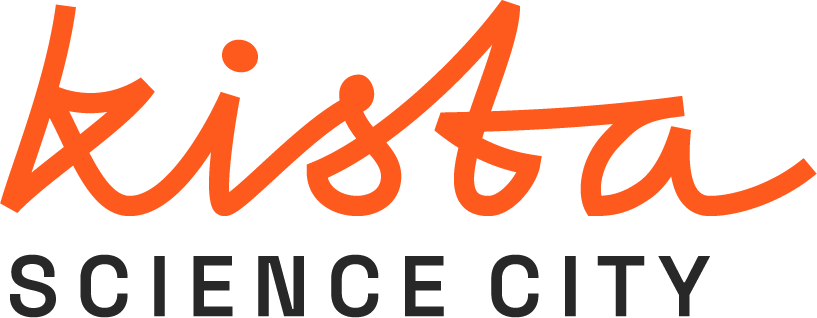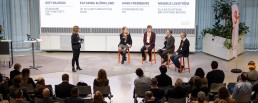Light and logic strengthen Sweden’s defence capability
When Sweden’s photonics sector recently gathered in Kista for Optics & Photonics in Sweden (OPS), one theme dominated – defence. The conference demonstrated how light-based technology is rapidly becoming a cornerstone of Europe’s security capability.
Behind every drone, every satellite and every secure communication link, light is now becoming a strategic necessity. But what makes photonics so vital to modern defence, and what positions Sweden as a strong contributor?
The photonic advantage in modern defence
Photonics – the science of how light can be controlled and applied – makes it possible to create systems that are faster and more efficient than traditional electronics. When combined with semiconductor technology, information can be transmitted more quickly, with lower energy consumption and higher precision.
Concrete applications include infrared sensors and LiDAR systems that detect drones and missiles long before they appear on conventional radar. Optical communication links enable secure, interference-free data transfer, and in the future, quantum photonics will open the door to unbreakable encryption and even more advanced detection systems.
A Swedish ecosystem for innovation
In Sweden, a complete photonics ecosystem has emerged, bringing together research, innovative startups and international industry. Each category contributes to the nation’s technological sovereignty and defence readiness:
Sensor and Imaging Technology
- IRnova – Develops advanced infrared detectors extending the range and precision of surveillance and targeting systems across air, land and maritime domains.
- Teledyne FLIR – Delivers multispectral and thermal imaging systems for drone detection, target tracking and battlefield monitoring, enhancing situational awareness.
Semiconductor and photonic integration
- Mycronic – Provides world-leading photomask writers and die-bonding equipment used in the manufacturing of next-generation photonic and semiconductor chips, ensuring secure and traceable European production capacity.
- Silex Microsystems – Operates one of the world’s most advanced MEMS foundries, producing miniaturised sensors and actuators critical for navigation, guidance and environmental sensing in modern defence systems.
Laser and optical systems
- Lumibird Photonics Sweden – Supplies high-performance laser rangefinders and designators for naval, airborne and ground applications, contributing to precision targeting and autonomous systems.
Together, these companies, along with coordinative initiatives like Semiconductor Arena in Kista Science City, form the basis of a national value chain where research becomes production – and production becomes operational capability.
From policy to capability
Transforming innovation into defence capability requires coordination. Photonics, as the optical backbone of next-generation chips, represents the intersection where Sweden’s strengths in defence innovation meet Europe’s semiconductor ambitions.
“Over the past year, we’ve noticed a clear increase in openness and curiosity from both defence organisations and their industrial partners. It’s not just about scouting new technology anymore – it’s about understanding what Swedish deep-tech companies can bring to the next generation of systems,” says Peter Tiberg, Chief Product & Commercial Officer at Polar Light Technologies, a Swedish startup at the forefront of MicroLED development. “For us, this means focusing on building trust through transparency, reliable delivery, and long-term commitment rather than quick pivots.”
Within the framework of the EU Chips Act and a broader ambition for strategic autonomy, Sweden contributes its expertise to the shared defence goals of the EU and NATO. Standardisation and cooperation strengthen interoperability, allowing allied systems to share both materiel and data.
Sweden’s Minister for Defence, Pål Jonsson, has emphasised the strategic link between semiconductors and national security. At the core of this lies Europe’s common need for technological sovereignty – and to secure knowledge and production capacity within the Union’s borders.
The time is now
A global race is underway, as nations invest heavily in semiconductors and emerging technologies such as photonics. Sweden is uniquely positioned, with expertise across the entire value chain – from laboratories and test facilities to companies that have advanced optical science for decades.
“Right now, enormous amounts of money are being poured into the market,” says Raoul Stubbe, Deep Tech Business Coach and Co-founder at Sting. “It creates opportunities for new actors to take their place. But once the funds are locked into long-term projects in Sweden and NATO, the window for new initiatives will close.”
The Swedish ecosystem already has all the pieces in place to succeed in combining light (photonics) with logic (semiconductors) and defence. The next step is increased coordination between actors at all levels throughout the chain, from research and production, and ultimately military capability. To secure a strong position, we need the determination to act together – before others do.
Do you want to get involved? Reach out to hanna.eldh@kista.com
–
Semiconductor Arena is co-funded by the European Union and Region Stockholm, and is run by Kista Science City, KTH, RISE and Sting.
Made in Kista: AI on Swedish terms
Updated December 2025
Made in Kista: AI on Swedish terms
Artificial intelligence is moving beyond clever applications and into the systems that run our societies. As it becomes embedded in healthcare, finance and education, a central question emerges: where does the technology run, and who controls the data behind it?
For Europe, and for Sweden, the answer is increasingly about AI sovereignty. The EU’s new AI Act is raising the bar for security and accountability, while organisations also want reassurance that sensitive data stays within national borders. Together, these demands are accelerating the push for secure, local solutions. In Kista, that shift is visible with new facilities and projects underway.
Secure AI in Kista
This summer, 6G AI Sweden launched a sovereign AI cloud at atNorth’s data centre in Kista. Built on NVIDIA’s reference architecture and powered by H200 GPUs, the facility gives Swedish organisations access to advanced AI capacity within national borders. The operation complies fully with GDPR and the AI Act, and runs entirely on renewable energy, with surplus heat recycled into Stockholm’s district heating grid. With a multi-billion-SEK hardware investment, the project demonstrates long-term commitment and offers a local alternative to foreign-controlled infrastructure.
The need for such alternatives is increasing. Even when data is stored on servers in Sweden, it can fall under foreign legislation if the provider is headquartered abroad. The US Cloud Act is one example, allowing American authorities to request data from US-owned companies regardless of where their servers are located. In an uncertain geopolitical environment, this legal distinction has become central for public institutions and regulated sectors working with sensitive information.
This is the challenge 6G AI Sweden aims to address. As a Swedish-owned provider operating on Swedish territory, the company gives organisations a way to run sensitive or regulated AI workloads in an environment aligned with domestic and EU legislation. The investment in high-performance compute also reflects a broader shift: the need to build capability across the AI stack, from physical infrastructure to the services and applications built on it.
However, the move toward sovereign AI is not about cutting ties with global cloud providers. Large global cloud providers (hyperscalers) will remain essential, and Sweden has no realistic path to replacing them at scale. What matters is having secure domestic options for information that requires stronger protection. For most organisations, this points to a hybrid future where sensitive workloads run locally while other operations remain on international platforms.
Another company, Berget AI, has opened Sweden’s first fully Swedish-owned AI infrastructure and inference service. The facility, also located in Kista, is designed to ensure that no data leaves the country, offering a way for organisations to avoid exposure to foreign legislation. Within months of launch, Berget AI was trusted by Riksbanken with sensitive workloads — a clear signal that their services meet the needs of Sweden’s most security-conscious institutions.
Taken together, these investments underline that Sweden’s sovereign AI capacity is no longer a vision but a resource being built in practice.
From ambition to adoption
Europe’s reliance on non-European infrastructure has long been viewed as a vulnerability, limiting control over both security and data. The AI Act is designed to change that, setting clearer standards for traceability, risk management and accountability. For Swedish organisations, the challenge is now less about knowledge and ambition, and more about moving from isolated pilots to large-scale use on platforms that meet these requirements.
This is where domestic infrastructure becomes crucial. Local providers anchored in Swedish and European legislation lower the threshold for public institutions and regulated sectors to deploy AI responsibly. They offer an environment where security, jurisdiction and compliance are built in from the start.
Sweden is well positioned to build and maintain this capacity over time. Low-cost electricity and a cold climate lower operating costs for energy-intensive AI workloads. Combined with stable national governance and a mature innovation ecosystem, these factors create strong conditions for long-term investment in domestic AI infrastructure.
By expanding sovereign infrastructure and anchoring capability locally, Sweden can move from early experimentation to broad adoption in ways that ensure trust, competitiveness and resilience. The capacity now being built in Kista is one example of how this transition is taking shape, giving Sweden the opportunity to develop and deploy AI on its own terms.
Innovation and Defence: NATO Innovation Fund in Kista
How can innovation help build resilience in an unpredictable world? For the NATO Innovation Fund (NIF), the answer lies in cross-sectoral collaboration—connecting the brightest minds in tech with defence stakeholders to tackle evolving security challenges. This mission brought NIF to Kista Science City where some of the country’s leading deep-tech companies took center stage.
NIF: Investing in resilience
The NATO Innovation Fund is the world’s first multi-sovereign venture capital fund, backed by 24 member nations and equipped with €1 billion to deploy over 15 years. Its mission: to support early-stage European tech companies developing solutions that strengthen resilience and security across the Alliance.
Sweden, NATO’s newest member state and home to one of Europe’s most established venture ecosystems, was a natural choice for this engagement. “Sweden has had great success in innovation and scaling companies globally,” said Patrick Schneider-Sikorsky of NATO Innovation Fund. “The frameworks here make it an exceptional place to do business. We look to invest in early-stage, breakthrough solutions, and Sweden offers outstanding potential for innovation.”
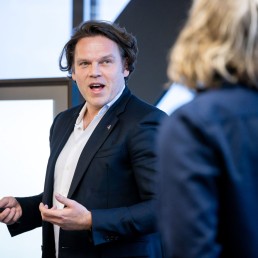
Patrick Schneider-Sakorzky, Partner at Nato Innovation Fund
Pioneering tech on display
Kista was one of only two stops on NIF’s Sweden tour, chosen for its strong ecosystem of deep-tech companies. The visit was part of their broader strategy to identify and invest in dual-use technologies—solutions with applications in both civilian and defence settings. These technologies are key to addressing modern security challenges, from safeguarding critical infrastructure to enhancing resilience against cyber threats.
During the event, 10 Stockholm-based companies presented their solutions. These included technologies in autonomous systems, energy solutions, advanced materials, and next-gen communication technologies. Here’s how three of these companies are driving innovation that could support security and resilience efforts:
Ovzon: Resilient satellite communications
Ovzon presented its advanced satellite system, designed to ensure secure communication in contested environments and enabling multi-domain operations. With features like GPS-denial resilience, ultra-mobile terminals and full sovereign control, Ovzon’s technology supports NATO Innovation Fund’s mission to enhance resilience and build next-generation communication systems. “Secure, reliable communication is critical for defence operations, and our technology addresses those needs, already today in the most demanding environments,” said Per Wahlberg, Deputy CEO of Ovzon.
Papershell: Next-gen lightweight materials
Papershell introduced its biogenic material that is lighter than aluminum, stronger than plastic, and 100% fossil-free. With automated, flexible production in Sweden, it can rapidly scale for applications across industries, ranging from automotive to drone manufacturing. The company’s innovation aligns with NATO Innovation Fund’s focus
on resource sustainment for defence and civil needs. “By using locally sourced input materials, we create a 100% biogenic, fossil carbon-free alternative—proving that sustainability and resilience go hand in hand,” said Anders Breitholtz, CEO of Papershell.
As the company scales production, its goal is to provide one of the market’s cheapest load-bearing materials, making it a cost-effective alternative to traditional composites. This would help member nations reduce reliance on foreign-subsidized materials while significantly cutting emissions.
TeraSi: Compact and secure connectivity solutions
TeraSi showcased its RF modules, capable of securely transferring large volumes of data, even on moving platforms like drones. The compact design and efficiency of this technology directly support NATO Innovation Fund’s goal of advancing secure, deployable communication systems for defence operations. “Connectivity is vital for protecting critical assets, and our solutions make it possible to securely transfer data across domains,” said James Campion, CEO of TeraSi.
With ambitions to enable seamless data transfer across air, space, and terrestrial networks, TeraSi is paving the way for fiber-like connectivity in dynamic environments. Read Dagens Industri’s interview with CEO James Campion to learn more about the company’s advancements (subscription required).
Key takeaways from the event
NATO Innovation Fund’s visit to Kista Science City underscored an important shift: private sector innovation is now a driving force in modern security and defence. As security threats evolve, so must the solutions, and effective collaboration between innovators and defence stakeholders is essential to staying ahead. Here’s what we know:
- Sweden’s NATO membership is unlocking opportunities for its tech industry. Since joining the Alliance in March 2024, Swedish tech companies have new pathways to contribute on a global scale—not only in security and defence but also in strengthening international partnerships and knowledge-sharing across borders.
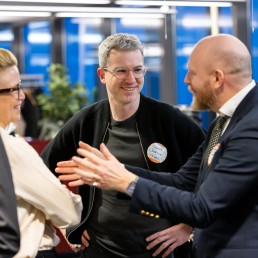
- Bridging private-sector innovation with defence needs is essential. As security challenges evolve, so does the need for cutting-edge solutions—many of which now emerge from the private sector. Stronger collaboration between startups, investors, and defence stakeholders ensures that these innovations are developed, scaled, and deployed where they can have the greatest impact.
- Adaptable technology is key to building resilience in an unpredictable world. Modern security threats are increasingly complex, spanning cyber risks, physical vulnerabilities, and shifting global tensions. To stay ahead, defence and security systems must integrate flexible, dual-use technologies that can evolve alongside emerging challenges.
Our commitment
Sweden’s innovation ecosystem is becoming increasingly connected to the international defence landscape, and Kista Science City is part of that process. We work closely with tech innovators, investors, and global defence stakeholders—helping companies navigate regulatory landscapes, secure funding, and build strategic partnerships that drive meaningful impact.
Do you want to get involved? Reach out to sakarias.strand@kista.com to explore opportunities for collaboration!
Civil tech to power up defence
Civil tech to power up defence
With global security challenges on the rise, the integration of new technologies into the defense sector has become a priority for Sweden. Central to this initiative is the effort to bridge the gap between the civil sector’s technological solutions and the defense industry’s specific needs. Sweden’s rich ecosystem of startups and scaleups is increasingly recognized as crucial to strengthening Sweden’s framework as these companies offer groundbreaking innovations and fresh perspectives that help navigate the challenges of modern security threats.
Bridging civil and defence sectors
Shared visions and increased collaboration between the civil and defence sectors are key. There is a pressing need to close the gap that has been widening between these sectors, and actors across the spectrum call for a more integrated approach. The synergy of civil sector innovation and defence expertise safeguards national security.
A tradition of innovation
Sweden’s role as a pioneer in technological innovation is a strategic asset in its defence policy. As security concerns increase, we must ensure that Sweden remains at the forefront of defence technology, ready to meet the challenges of tomorrow. This includes investing in research and development, encouraging cross-sectoral knowledge exchange, and creating an environment where innovative ideas can flourish and be rapidly deployed.
The role of startups and scaleups
Startups and scaleups are essential partners in driving technological advancements in the defence sector. Their agility, innovative approaches, and groundbreaking technologies are critical for enhancing Sweden’s defence capabilities, making their involvement essential for the nation’s security framework. To boost this involvement, there is a need for supportive frameworks that facilitate these partnerships, including funding mechanisms, regulatory support, and platforms for collaboration.
Insights from the Swedish Minister for Defence
At a recent event on Defense and Innovation, Swedish Minister for Defence, Pål Jonson, stressed the critical need for innovative solutions amidst growing security challenges in Sweden and Europe. Jonson acknowledged the civil sector’s significant role and potential in enhancing Sweden’s defence through technology and innovation. He also emphasized the government’s desire for more coordinated efforts in innovation and for lowering the barriers for new companies to contribute to the defence sector.
The event brought together a mix of cutting-edge startups and scaleups, and decision-makers to explore the potential of civil sector innovations in meeting defence needs.
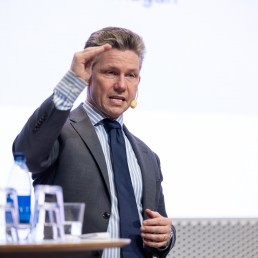
The minister directly addressed startups and scaleups: “I’m here today because I need your help. We want to work more with you, and we need to make this journey together to make Sweden safer, now and in the future” the minister stressed.
Partnering for a secure future
Collaboration, innovation, and a shared commitment to security are vital for tech companies and the defence sector alike. By embracing these principles, Sweden and Europe can navigate modern security challenges, ensuring a safer tomorrow.
This discussion underscores a collective ambition to not only address current security challenges but also work proactively to prepare for the future. Central to these efforts is the role of startups and scaleups, whose groundbreaking innovations are key to driving Sweden’s technological advancements in defence.
However, this requires an ecosystem that supports innovation and new partnerships, ensuring accessible funding, supportive policies, and platforms that foster cross-sectoral collaborations. The way forward is marked by collaboration, innovation, and a shared commitment to national and global security.
New funding and collaboration opportunities
Sweden and Europe are responding to the need for defense innovation by introducing several key funding and collaboration opportunities. These efforts aim to engage startups and scaleups, empowering them to bring innovative solutions to the defense sector. By focusing on these companies, the goal is to make the defense industry more dynamic and responsive to evolving security needs.
Some of these initiatives are:
European Defence Fund (EDF)
A European Commission initiative, aimed to support collaborative defence projects. It focuses on funding the development of small and medium enterprises (SMEs) at various stages, from research to market deployment.
NATO Innovation Fund (NIF)
Aimed at enhancing NATO’s innovation ecosystem, NIF supports deep tech innovations in science, technology, engineering and mathematics (STEM). It facilitates the commercialization of technologies vital for the Alliance’s security by addressing the funding gap in the market.
DIANA (NATO)
An acceleration program and network of test centers connecting startups with end users, scientists, and integrators to promote the development of dual-use deep tech solutions for NATO.
Säkerhets- och försvarsföretagen (SOFF)
A trade association for the security and defence industry in Sweden. SOFF works to improve market access and trade opportunities for companies within the sector, fostering a competitive business environment.
SME-D
As a network and knowledge hub, SME-D promotes collaboration, competence development, and experience exchange. Its goal is to enhance the competitiveness of its members and ensure the continuous supply of skills in the industry.
